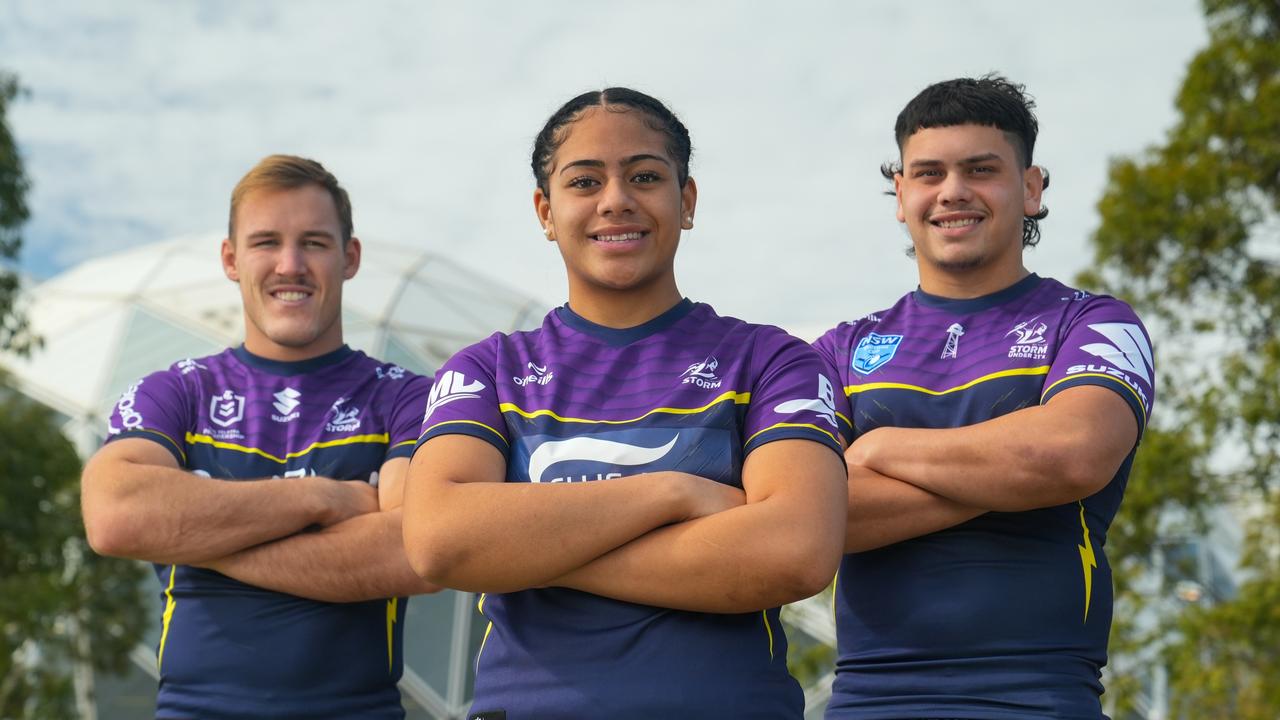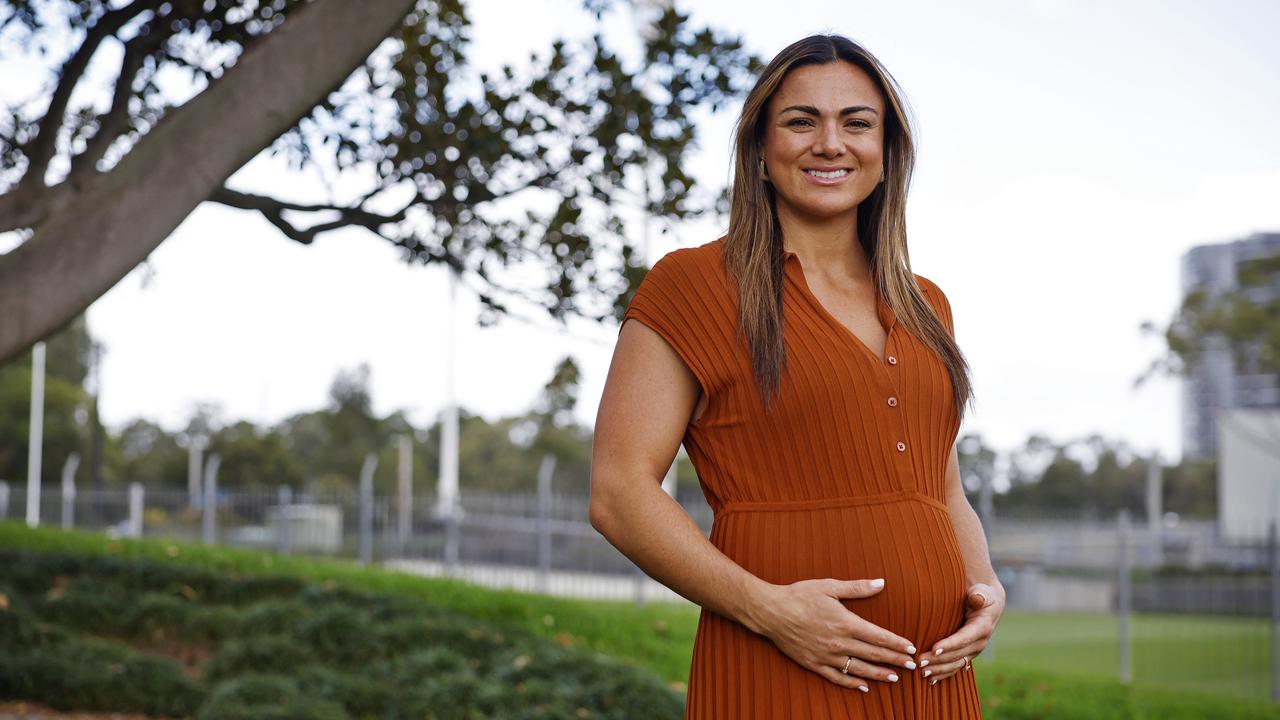Paul Kent: Transgender athlete debate set to impact NRLW competition
Should a transgender athlete be allowed to play in the NRLW? It’s the debate the NRL is about to enter into as the topic dominates sport around the world.

NRLW
Don't miss out on the headlines from NRLW. Followed categories will be added to My News.
Sportswriting used to be a simple business.
It consisted, essentially, of a basic need to get the scoreline correct, proper punctuation in almost all the right places, and ignoring a nagging twinge around the fourth lumbar.
Outside of that you were good to go.
The Americans used to refer to the sports section as the toy department. It was adults playing children’s games, went the consensus, and so they treated it as such.
The good ones never could understand why fully grown fans would fall into deep despairs when their team got outscored or a basket didn’t rim or their team took the wrong running back in the draft.
Times change, though, and, like life, it got complex.
Stream every game of every round of the 2022 NRL Telstra Premiership Season Live & Ad-Break Free In Play on Kayo. New to Kayo? Try 14-days free now.

Which brings us to today’s sermon and a conversation around what seems to becoming one of life’s unsolvable puzzles.
In the latter parts of this week, the big shirts inside the NRL have been making themselves busy over an issue that was always going to land on their desk at some point or another but which might now be just weeks away.
Should a transgender athlete be allowed to play in the NRLW?
As of Wednesday, all 150 women in the NRLW became free agents and, as could only happen when the NRL and Rugby League Players Association clunked heads together, they have opened the trade window for the new competition beginning in August, just as the finals are about to begin for the current season.
And it is understood at least one transgender player is considering trialling.
This is hurried news for the NRL.
Much of the news in America this week moved from the sports section to the front pages when trans swimmer Lia Thomas, who still has male anatomy, swam within the rules as a woman at the NCAA Swimming Championships.

As a male, Thomas was ranked 554th in the country in the 500-yard freestyle.
As a female, she won gold in the NCAA Championships in 500-yard freestyle, beating Emma Weyant by 1.75 seconds, who last year won a silver medal at the Tokyo Olympics.
Nobody in America knows how to answer it.
The reality is, though, Thomas stands six-three in the old scale and, while she identifies as a female, and has had hormone therapy to bring down her testosterone, she retains many physical advantages, as insignificant as some might seem.
The big hands and feet of a male, for instance, act as paddles in the water.
She also has the higher bone density of a male and the greater muscle mass and other physical advantages, like greater lung capacity.
It is enough to make you wonder what part of the athlete inside Thomas can find the enjoyment in winning, that pure enjoyment that comes with work and reward, against others when she has such clear advantages.
But nobody wants to speak of that. Instead, the honest conversation happens in hushed tones in quiet hallways while political agendas are pushed, for some apparent greater cause, while the sport itself is at risk.

It was enough that this week former Olympic champion and World Athletics president Sebastian Coe said not only the integrity of women’s sport, but the future of women’s sport, was “very fragile”.
A significant part to Coe’s concern, one that gets overlooked by the pro-inclusion mob, is he believes the one year required for hormonal treatment, to bring down testosterone levels, is not enough.
“We are asking for a greater length of [time] before competition because the residual impact of transitioning like that is more profound,” he said in London’s The Times on Monday.
“There is no question that testosterone is the key determinant in performance.”
Of course this is a problem.
Once upon a time, when the hair was a little thicker and we still believed in this notion of sport as a fair playing field, athletes busted with performance-enhancing drugs were outed for four years because the science said it took four years before the benefits of a drug program had left the body.
It was later reduced to two, not for fair play reasons, but mainly because sports like World Athletics campaigned that the absence of their star athletes, sidelined and serving suspensions, were too long and damaging the sport.
Yet it still remains two years for a drug positive but one year for transitioning.
And while testosterone is the key determinant, to Coe’s point, it is not the only advantage.
Thomas retains other physical advantages over her opponents, like those big paddles propelling her through the water.
Part of the difficulty is how swiftly times change, which means how swiftly values change.
Cancel culture is a changing playground. Many are quick to be offended on another’s behalf.
Just a few years back, for instance, the great tennis champion Martina Navratilova, a lesbian, was publicly calling for Margaret Court’s name to be removed from Margaret Court Arena, where the Australian Open final is played.
Court is a Pentecostal minister, and does not believe in same-sex marriage. She has believed in that all her life.

Yet her Christian beliefs are dismissed in the name of progress, apparently, the same respect her opponents claim they are asking for not afforded to her.
Navratilova, who is married, was offended at Court’s stance and the LGBTQ supporters swiftly backed Navratilova. So much the campaign to remove her name is now an annual event.
Then three years ago the ex-tennis champ briefly forgot her politics and, in a newspaper column, described trans women as men who “decide to be female” and that being allowed to compete against someone born a female was “cheating”.
She was speaking in terms of tennis.
Yet just as quickly as they championed her the LGBTQ community dropped her, removing her from an athlete advisory board, condemning her thoughts, labelling her a “transphobe”.
Times change, values change.
The presence of a transgender athlete wanting to play in the NRLW is inevitable, and closer than most think.
Yet the NRL will have a tougher time than other sports like swimming and tennis and even weightlifting, where New Zealand heavyweight lifter Laurel Hubbard dominates competition after transitioning, because there is an extra level of complexity.

When does safety become an issue?
Swimming is a non-contact sport, as are tennis and weightlifting.
If a tall, 100kg transgender athlete is about to trial for a contract in the new competition later this season, when the contracting period opens in June, and for which there is a strong chance of it happening, where does the games sit?
As of Friday, the NRL was still trying to finalise its position.
The one piece of advice from this corner of the toy department is that whatever protocols are in place in other sports around the world, as the League is investigating, the NRL should take them and double it.
Or just say no.
IN A LEAGUE OF ITS OWN
The opinion might be biased but it says here that rugby league is the toughest mainstream sport in the world, and creates the toughest athletes.
The reminder was there again Wednesday night when Sonny Bill Williams knocked out Barry Hall in less time than it took him to put on his gloves.
Williams was born and bred a rugby league player, even though he retired an All Black.
In his corner was Anthony Mundine, who quit the NRL to take up boxing and won several world titles while taking on the best in the world.


Jeff Fenech was a Jersey Flegg player for Newtown and took up boxing for extra fitness. He is in boxing’s Hall of Fame.
The current WBA, WBO, IBF and Ring Magazine world lightweight champion is George Kambosos, who played in Cronulla’s junior development squads before focusing on boxing.
Garth Wood was a journeyman league player who reached greater heights as a fighter, winning various regional titles.
Elsewhere, the evidence is also overwhelming.
Former Bronco Darius Boyd is the street-corner tip to take out the SAS competition on Channel 7, which puts contestants through all sorts of mental and physical hell.
To do so, he will have to beat current Broncos NRLW prop Millie Boyle, who might be tougher than all of them and will be there at the finish.
The last SAS series, of course, was won by Sam Burgess.
The current UFC featherweight champion is Alex Volkanovski, who was a good enough prop for the Warilla Gorillas to win the Mick Cronin Award for the best player in the Group 7 competition, led the Gorillas to a premiership, then stripped off a stack of weight to become the reigning UFC champ.
Originally published as Paul Kent: Transgender athlete debate set to impact NRLW competition





